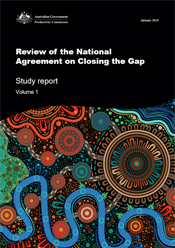Closing the Gap review
Study report
Released 07 / 02 / 2024
This report was handed to the Joint Council on Closing the Gap on 24 January 2024 and publicly released on 7 February 2024.
This is the Productivity Commission’s first review of progress on the National Agreement on Closing the Gap. The key message of this report is that fundamental changes are required to deliver on the Agreement.

Webinar: Final Report - Review of the National Agreement on Closing the Gap
Slides
Transcript
Media release
The National Agreement on Closing the Gap is an opportunity governments cannot continue to waste
The Productivity Commission has found governments have largely not fulfilled their commitments under the National Agreement on Closing the Gap and has made four recommendations to drive progress.
The final report of the Commission’s first three-yearly review of government action on the agreement finds governments have failed to fully grasp the nature and scale of change required to meet the obligations they signed up to under the agreement.
“To date, most government actions and plans to implement the agreement relabel business-as-usual, or simply tweak existing ways of working,” said Commissioner Natalie Siegel-Brown.
“The agreement can and should be a blueprint for real reform, but governments will need to move beyond business as usual and address the entrenched attitudes, assumptions and ways of working that are preventing progress.”
The report makes four recommendations to government: share power; recognise and support Indigenous Data Sovereignty; fundamentally rethink mainstream government systems and culture; and implement stronger accountability.
Sharing power with Aboriginal and Torres Strait Islander people to make decisions about their communities lies at the heart of what governments committed to. But the Commission found evidence of a failure to relinquish power and the persistence of ‘government knows best’ thinking.
To address this, the report’s first recommendation proposes five actions, including amending the agreement to better emphasise power sharing, and having governments recognise the expertise of Aboriginal Community Controlled Organisations in what works for their communities.
“Efforts to improve outcomes are far more likely to succeed when Aboriginal and Torres Strait Islander people lead their design and implementation. Nothing will change until this model of partnership, based on genuine power sharing, becomes the rule and not the exception,” said Commissioner Romlie Mokak.
The report finds that progress is unlikely unless government organisations fundamentally rethink their systems, culture and ways of working.
“The lack of progress we have seen reflects a disregard for Aboriginal and Torres Strait Islander people’s knowledges and solutions throughout government. Breaking down these entrenched attitudes and ways of working will require a focused and deliberate effort from every department and organisation,” said Commissioner Siegel-Brown.
It recommends that all government departments take a series of actions to overhaul how they work with Aboriginal and Torres Strait Islander people, including developing and executing an evidence-based transformation strategy.
The report also recommends amending the agreement to support Indigenous Data Sovereignty – the right of Indigenous people to exercise ownership over Indigenous data.
These recommendations must be supported by the report’s fourth recommendation: stronger accountability.
“The Agreement provides for an independent mechanism that will drive accountability by supporting, monitoring and reporting on governments’ transformations, but here too governments have dragged their feet. Without further delay, each jurisdiction should establish a strong legislated independent oversight mechanism. Obligations under the agreement should also be embedded in all other significant intergovernmental agreements and reported on in each organisation’s annual report,” said Commissioner Mokak.
“If governments do not make change on the scale that’s required, the agreement will fail and the gap will remain. For governments to help close the gap between improvements in the life outcomes of Indigenous and non-Indigenous Australians, they will first need to close the gap between words and action.”
The Review of the National Agreement on Closing the Gap final report is available from pc.gov.au/ctg-review
Media requests
02 6240 3330 / media@pc.gov.au
Contents
Volume 1 – Study report
- Preliminaries: Cover, Copyright and publication detail, Foreword, Terms of reference, Disclosure of interests, Acknowledgements and Contents
- Executive summary
- Recommendations and actions
- 1. The role of the National Agreement on Closing the Gap
- 2. Assessing progress towards the Priority Reforms
- 3. Priority Reform 1: Shared decision making
- 4. Priority Reform 2: Strengthening the community controlled sector
- 5. Priority Reform 3: Transforming government organisations
- 6. Priority Reform 4: Aboriginal and Torres Strait Islander-led data
- 7. Tracking progress towards outcomes
- 8. Embedding responsibility and accountability for change
- Abbreviations
- References
Volume 2 – Supporting paper
- Preliminaries: Cover, Copyright and publication detail, Contents and Acknowledgements
- 1. The National Agreement in context and our approach to the review
- 2. Priority Reform 1: Partnerships and shared decision making
- 3. Priority Reform 2: Strengthening the community-controlled sector
- 4. Priority Reform 3: Transforming government organisations
- 5. Priority Reform 4: Shared access to data and information at a regional level
- 6. Tracking progress
- 7. Accountability for improving life outcomes for Aboriginal and Torres Strait Islander people
- 8. Progress on socio-economic outcomes
- 9. What we heard
- Appendices
- A. Meetings, visits and submissions
- B. Implementation of the transformation elements
- C. The Agreement’s outcomes and targets
- References
Fact sheets
- National Agreement on Closing the Gap: Approach to the Review
- Priority Reform 1: Formal partnerships and shared decision-making
- Priority Reform 2: Strengthening the community-controlled sector
- Priority Reform 3: Transforming government organisations
- Priority Reform 4: Shared access to data and information at a regional level
- Tracking progress: Knowing if the Agreement is making a difference
- Accountability: Ways to drive change
- Socio-economic outcome areas: Assessing progress in the socio-economic outcome (SEO) areas
Printed copies
Printed copies of this report can be purchased from Canprint Communications.
We value your comments about this publication and encourage you to provide feedback.